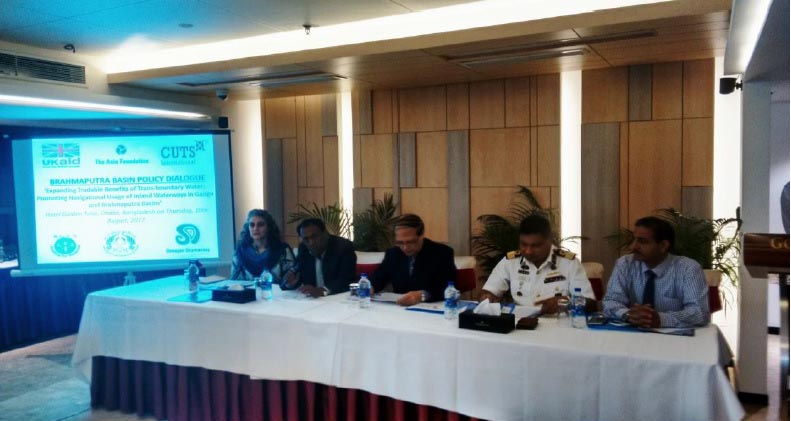On 10th August, 2017, government officials, civil society participants and private sector experts joined CUTS International and its strategic partners in Dhaka, Bangladesh to deliberate on avenues of policy cooperation for waterways in the Brahmaputra basin.

Bangladesh, Bhutan and India have varied priorities for expanding the tradable benefits of transboundary water and in Brahmaputra. While they are not always the same, creation of sustainable livelihoods is a common priority and can help as a driver for taking forward the discourse on waterways connectivity. The various drivers for prioritising benefits from rivers like sustainable tourism and waterway development for trade and transit need to be identified and linked to sustainable livelihood creation at the ground level. Governments and private sectors can then help enable higher connectivity through infrastructure development, enabling policy frameworks and the required investment.
This was the conclusion of the ‘Brahmaputra Basin Policy Dialogue’ held by CUTS International as part of the project titled ‘Expanding tradable benefits of trans-boundary water: Promoting navigational usage of inland waterways in Ganga and Brahmaputra basins’. This meeting was preceded by the Ganga Basin Policy Dialogue at Kathmandu, Nepal on July 14, 2017 with participants from Bangladesh, India and Nepal.
Commodore Mohammad Mozammel Haque, Chairman, Bangladesh Inland Water Transport Authority delivered the keynote address by elaborating on multiple regional agreements that Bangladesh has with India and Bhutan. Mr. Ajay Kumar Bansal, Director (Regional Office, Guwahati), Inland Waterways Authority of India elaborated in the keynote address on the sustainable management of waterways. He also shared that the detailed project reports for multiple infrastructure projects on National Waterway 2 to connect the North East Region of India with Bangladesh are in progress.
Delivering the opening address, Dr. Atiur Rahman, Chairman, Unnayan Shamannay elaborated on the challenges hampering intra-regional trade in South Asia. He also emphasized on the intrinsic relationship of Ganga, Brahmaputra, Meghna with the livelihood, culture and civilization of South Asian countries. Speaking at the opening session, Mr. Bipul Chatterjee, Executive Director, CUTS International stressed on the importance of multimodal connectivity for strengthening regional trade growth. He also reminded that we can learn from the lessons of history on promoting waterways as an environment friendly and cheap mode for passenger and cargo movement.
The event was successful in policy deliberations for various avenues related to waterways. To generate the interest of private sector for cargo movement via waterways, substantial fuel subsidies and removal of trade barriers were suggested. For example the recent agreement between Bangladesh and Bhutan with Narayanganj as port of call will facilitate tremendous ease of movement of goods among Bangladesh, Bhutan and India. Similarly green standards and protocols for promoting sustainable transboundary tourism is another avenue for expanding the benefits of waterways. In addition to these discussions, the avenues for income generating activities for local communities, especially women, were also discussed.
The event was organized in partnership with Unnayan Shamannay (Bangladesh), Royal Society for the Protection of Nature (RSPN) and Rashtriya Gramin Vikas Nidhi (Assam). The event also had participation from community organizations like River Guides of Panbang (Bhutan) and Riverine People (Bangladesh).
For more information please contact:
Mr. Bipul Chatterjee, Executive Director, CUTS International
Email: bc@cuts.org, MO: +91-9829285921
